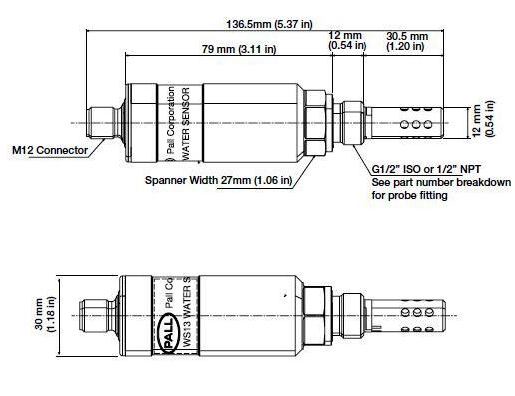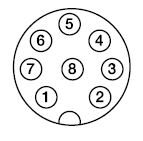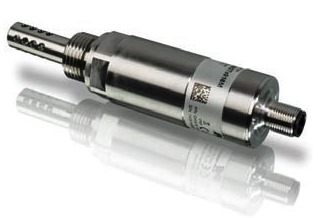Datasheets
Download:The Pall WS12/WS13 Series water sensor is an ideal, low-cost, in-line, monitoring solution for real-time measurement of dissolved water content in hydraulic, lubricating and insulating fluids, and diesel fuels.
- Specifically designed for use in harsh and often remote industrial environments, the Pall water sensor helps reduce downtime with rapid, accurate, reliable measurement of water contamination
- When connected to the user's control systems, Pall's water sensor provides a key component in the predictive maintenance of the plant and machinery.
Features
- A sensing probe directly immersed in the fluid to monitor dissolved water content and temperature
- Water content output in % saturation
- Temperature in °C or °F
- High pressure option up to 200 bar (2900 psi)
- Simple and flexible installation, simple to operate
- Robust all in-one modular housing and sensing probe design
- Two analogue outputs, 4 - 20 mA, for connections to existing SCADA and DCS systems
The Effect of Water in Oil
Water contamination in fluids can cause numerous problems such as additive depletion, oil oxidation, corrosion, reduced lubricating film thickness, microbial growth, and reduction of dielectric strength. These costly problems can be averted with continuous monitoring of oil water content so that timely action can be implemented.
Hydraulic, lubricating and insulating fluids and diesel fuels should be operated without the presence of free water and with dissolved water levels at 50 % saturation or considerably lower in the case of insulating oils.
Measuring water content in oil Parts per Million (PPM)
A common industry practice is to report water content in oil in terms of parts per million (PPM). Whilst most fluids can tolerate a certain degree of water contamination, acceptable levels vary. 200 PPM of water in a phosphate ester based oil would be excellent. However, the same amount in a transformer oil would be catastrophic.
Measuring % Saturation
A more meaningful way to report water content is as a percentage of the water saturation level of the fluid for a given temperature. This method provides a better measure of how close the water content is to the formation of free water in the fluid. This allows action to be taken to bring the water content to an acceptable level before free water forms.
| Supply Voltage: | 21-28 VDC (requires ≥ 200 mA)) | |
Working Temperature Range |
||
| Sensing Probe: | 40 °C to 125 °C (-40 °F to 275 °F) | |
| Electronics: | - 40 °C to 80 °C (-40 °F to 176 °F) | |
| Fluid Compatibility: | Petroleum based and synthetic fluids. The water sensor is not to be used in water based fluids or aerospace phosphate ester hydraulic fluids. |
|
Pressure Range |
||
| Standard Model: | Up to 20 bar (290 psi) | |
| High Pressure Model: | Up to 200 bar (2900 psi) | |
Probe Connector |
||
| Standard model: | 1/2" NPT (male) or 1/2" BSPP (male) | |
| High Pressure model: | 3/8" BSPP (male) | |
| Electrical Connector: | M12 x 1 8-Pin plug | |
| Measurement Range: | 0 - 100% RH | |
| Accuracy: | At 20° C (68° F) | |
| Humidity Sensor: | ±2 % 0 to 90 % RH and ± 3 % 90 to 100 % Traceable to international standards,administered by NIST, PTB, BEV |
|
| Temperature Sensor: | +/- 0.2° C (0.36° F) | |
| Enclosure: | IP65 to IEC60529 (NEMA 4 to NEMA 250) | |
| Weight: | 0.43 kg (0.95 lb) | |
| Calibration Services: | Available from Pall; contact your local representative | |
| Outputs: | 4-20 mA Load < 500 Ohm OUT 1 = 0 to 100 % RH OUT 2 = -25 to 125 °C (-13 to 257 °F) |
|
- Primary Metals
- Rod Mill High Speed Lube Systems
- Cold Mill Tandem Mill
- Tilt Furnace HPU's
- Power Generation
- Wind Turbine Gear Box Lube
- Main Turbine Lube Oil
- Transformer Oil
- Pulp and Paper
- Dryer Section Lube Systems
- Wet End Lube Systems
- Press Section Hyd/Lube Systems
- Powerhouse - Steam Turbine Lube Systems
- Marine
- Main propulsion lubrication
- Hydraulic active fin stabilization
- Industrial In-plant
- Automotive
- Offshore / Petrochemicals
| Part Number | Pressure Rating | Connection |
| WS12SC08 | 20 bar (290 psi) | 1/2" BSPP thread to ISO 228 |
| WS12SB08 | 20 bar (290 psi) | 1/2" NPT thread to ANSI/ ASME B1.20.1. |
| WS13SC06 | 200 bar (2900 psi) | 3/8" BSPP thread to ISO 228 |

Connector Configuration (IEC 61076-2-101)
Plug for 4 - 20mA Connection (front view on pins)

| Description | Connection Assignment |
| NC | PIN 1 |
| RS485 B | PIN 2 |
| RS485 A | PIN 3 |
| Analogue Output 1 (4-20mA) | PIN 4 |
| Analogue Output 2 (4-20mA) | PIN 5 |
| GND | PIN 6 |
| NC | PIN 7 |
| V+ | PIN 8 |
We appreciate your review of this product. Please login to your account to leave a review.



